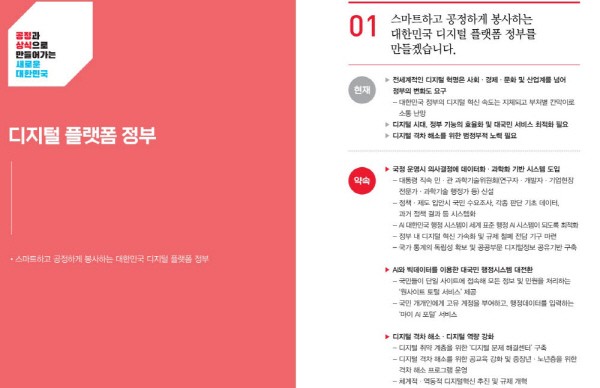
We are in an era in which software (SW) determines national competitiveness.
The use of software is rapidly increasing, not only in the information and communication technology (ICT) sector, but in allother industries. The battle to secure software developers is also fierce. The demand for digital transformation based on advanced software technologies such as cloud and artificial intelligence (AI) is also increasing.
For the past 50 years, Korea's economic growth has been driven by manufacturing. As the software industry has effectively become a 'zero-tier industry', there are many voices calling for a growth strategy centered onsoftware.
President-elect Seok-yeol Yoon proposed a 'digital platform government' as a pledge. He promised to transform the public administration system using AI and big data, and make data-based decisions when operating state affairs.
It was pointed out that in order to accomplish this,the software industry must be advanced beforehand but no specific planhas yet to be seen.
Above all, policies should be established and promoted from three perspectives: improving outdated systems and practices in the software industry, fostering high value-added products and competitive small and medium-sized enterprises, and nurturing human resources. To achieve this, a powerful control tower with the budget and execution capabilities is imperative.

◇Improving outdated systems is a top priority
With the efforts of the government and software companies, old practices in the software industry such as the abolition of the toxicprovisions in the Request for Proposal (RFP) have been improved. Nevertheless, there are still systems and practices that need to be improved.
Although it is mandatory to use function points (FP) when calculating the cost of a software project, the cost is still calculated based on the number of hours input (Man/Month) during the operation stage. Even in a development project that calculates the cost of FP, clients wantdeveloperson retainer and often count the number of personnel, so unusedpersonnelend up on standbyfor the duration of the project.
Despite concerns over the relocation of public institutions to provincial areas and the possibility of COVID-19, remote development has not been activated. There are many practices and systems that need to be revised, such as the maintenance rate of commercial software which sits at less than half of global products, outdated contract-subcontract structures, and the joint implementation method where everyone is responsible in the event of a problem.
There are many voices calling for strengthening separate orders to foster small and medium-sized software companies. Direct purchase (separate ordering) of commercial software in the software business is a legal obligation. However, if 'significant cost increase', 'significant delay', 'notably inefficient', etc. as defined in the National Contract Act or Local Government Contract Act, are judged to be problems, integrated orders can be placed after deliberation. Commercial software companies point out that the separate order rate is around 50% due to loose exceptions.
Pung-yeon Cho, chairman of the Korean SW/ICT Federation (KSWICT), said, "For server-based linkage middleware, which accounts for a large portion of the amount, there are many cases of integrated ordering with the clause to avoid separate ordering," adding, "Separate orders should be made mandatory and expanded for construction projects as well as maintenance projects."

◇High value-added commercial software development support is needed
In order to develop the software industry and become a digital powerhouse, competitive global companies and products must continue to emerge. Although Korea has invested in the software industry for a long time, the reality is that there are no software companies that can compete with Microsoft (MS) and Oracle.
The general consensus is that in order to be globally competitive, the structure of the system integration (SI)-oriented industry should be reorganized and improved to producehigh value-added commercial software such as cloud and AI. The Ministry of Science and ICT is also making efforts to reorganize the software industry with a focus on commercial software.
The key is to foster software-as-a-service (SaaS) companies through the cloud. As all software bases are being converted to the cloud, supporting small and medium-sized commercial software companies for SaaS is urgent. Support through budgets and projects to convert existing software to the cloud is required.
In government cloud projects such as public cloud conversion, a "separate order" method should be adopted so that SaaS or platform-as-a-service (PaaS) companies can grow. It is necessary to push for mandatory separate orders so that chronic subcontracting problems in existing system/network integration (SI/NI) projects cannot be reproduced in the cloud market.
Some argue that a policy to make commercial softwarean intangible assetis necessary for the initial growth of small and medium-sized commercial software. The main point is that the labor costs invested in software development should be recognized as an intangible asset of the company and a loan or investment should be made.
Young-sunSong, chairman of the Commercial SW Association, said, "In the medical and bio sector, special accounting standards have been established to recognize the cost of development as an asset," stressing, "Korea also needs to make commercial software intangible assets in order for companies and products like Oracle to come out."

◇Contribute to nurturing softwaretalent and creating jobs
An essential element to becoming a software-based digital powerhouse is quality manpower. As softwarebecomes the 'zero-tier industry', there is a shortage of software developers. Lack of manpower makes it difficult to respond to the digital transformation. Not only the softwareindustry, but all other industries and the country's competitiveness will inevitably lag behind.
Before the election, the software industry proposed 'nurturing 1 million SW talent' as a policy, but Seok-yeol Yoon did not include it in his pledge.
Jun-hee Cho, Chairman of the Korea Software Industry Association, said, “Software is the only field that can create jobs.” Basically, not only is there a shortage of software manpower, but also the manpower and computers required to promote the Green New Deal policy.
Chairman Cho said, "Software can earn high salaries not only for computer majors but also for those who majored in humanities and basic science withbrieftraining," adding, "We need to focus on fostering software talent in terms of industrial development and job creation."
Software companies emphasized the need to increase the number of elementary, middle, and high school software education hours and information teachers, reorganize existing specialized high schools, expand the quota for software-related universities, and reorganize digital-focused departments for manpower nurturing.
In Korea, the number of hours for elementary education is one hour per week (6 months) and one hour per week in middle school (1 year). It is pointed out that the effects of software education is insignificant and too rigid due to the lack of coding education teachers (1337 in 2019). In high school (68 hours), information subjects are optional, and schools that educate softwarehave a selection rate of around 50%.
In order to foster demand-oriented software talent, policies that require expansion of industrial technical personnel for military service, expansion of company-led (recruitment confirmation) training, transition of interrupted careers or retired software talent, and resolution of local talent biasare mentioned.
Software companies believe that a control tower is essential to establish and implement related policiesto improve outdated systems, develop high value-added software, and train human resources,in order to become a software powerhouse.
Chairman Cho emphasized, “While the role of the Science and Technology Committee, as stated by President-elect Yoon, is not clearly defined, whether it is the Science and Technology Committee or the existing 4th Industrial Revolution Committee, an executive organization with substantial budget and authority is needed.”
By staff reporter Ho-cheon Ahn (hcan@etnews.com)